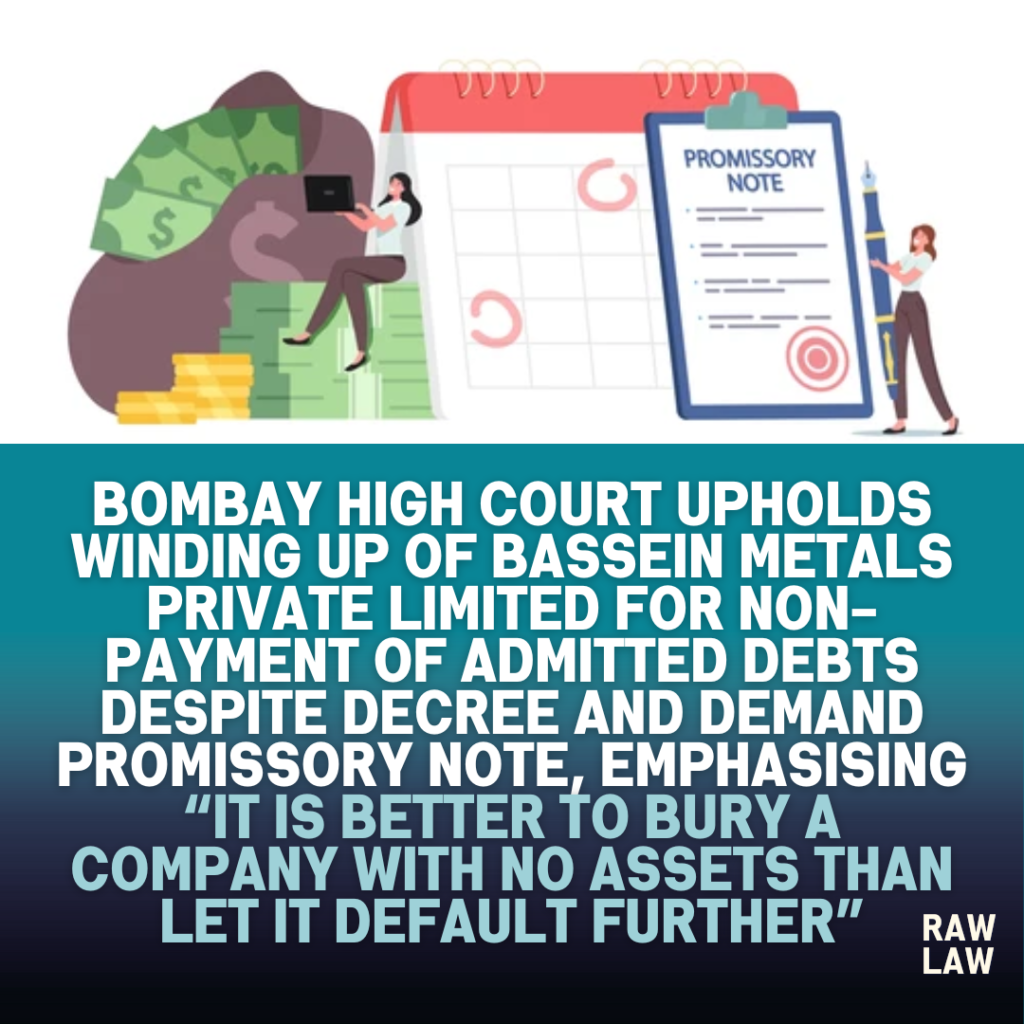Court’s Decision
The Bombay High Court dismissed the appeal filed by Bassein Metals Private Limited against the winding-up order dated 11 October 2007. The Court upheld the winding-up under Section 433(e) of the Companies Act, 1956, noting the admitted liability in the demand promissory note and a subsisting unchallenged decree, coupled with the company’s inactivity and absence of assets, justified winding up to protect creditor interests.
Facts
Bassein Metals Private Limited availed financial assistance under the Raw Material Assistance Scheme from a government undertaking in November 1992, supported by a demand promissory note and personal guarantee from its Managing Director. The company defaulted on payments, including cheques of substantial amounts issued in 1998, leading to dishonour and proceedings under Section 138 of the NI Act. A demand promissory note acknowledging liability of over ₹2.83 crore was executed in January 1999, with interest at 10% p.a. A winding-up notice was issued in July 2001, which the company vaguely denied. Subsequently, the company was ordered to be wound up, prompting the present appeal.
Issues
- Whether the company’s liability under the demand promissory note and decree constituted undisputed debt warranting winding up under Section 433(e) of the Companies Act.
- Whether acquittal in criminal cases under Section 138 of the NI Act negated the winding-up proceedings.
- Whether the company’s belated disputes were bona fide and substantial to resist a winding-up order.
Petitioner’s Arguments
The appellant argued that the winding-up order was erroneous as there was no crystallised debt, pointing to acquittals in Section 138 proceedings, and claimed discrepancies in the amounts demanded. The company contended that since the transactions were linked to service charges and the underlying cheques led to acquittals, the basis for the winding-up petition was undermined, and the winding-up was not warranted.
Respondent’s Arguments
The respondent, a government undertaking, submitted that the company had admitted liability through the demand promissory note, and the decree passed in a summary suit based on the same transactions remained unchallenged and unpaid, demonstrating the company’s inability to pay debts. The company’s non-payment despite repeated demands justified the winding-up petition to protect creditor interests and prevent further defaults.
Analysis of the Law
The Court analysed Section 433(e) of the Companies Act, 1956, which provides for winding up when a company is unable to pay its debts, emphasizing that the object is to prevent companies incapable of paying debts from continuing operations and defrauding creditors. It noted that defences to a winding-up petition must be bona fide, substantial, and supported by prima facie evidence.
Precedent Analysis
The judgment relied on:
- Madhusudan Gordhandas & Co. v. Madhu Woollen Industries Pvt. Ltd. (1972) 2 SCR 201: If the debt is undisputed, the court will not entertain defences of the company’s unwillingness to pay; only bona fide and substantial disputes can prevent winding up.
- John Paterson & Co. (I) Ltd v. Pramod Kumar Jalan (1983) 53 Com Cases 255 (Cal.): Winding up justified even when the debt arose from unpaid debentures, reinforcing that inability to pay admitted debts warrants winding up.
- Rydak Syndicate Ltd. v. Roshanlal Agarwal (2008) 81 SCL 323: Winding up can be ordered where part of the debt is admitted but remains unpaid.
- Roshan Singh & Co. P. Ltd. v. Daewoo Motors India Ltd. (2003) 41 SCL 284: Winding up protects future creditors and prevents companies from defaulting further.
The court distinguished Satish Chander Ahuja v. Sneha Ahuja (2021) 1 SCC 414, holding it inapplicable to the facts.
Court’s Reasoning
The Court observed:
- The company had admitted liability through a demand promissory note in January 1999 and did not dispute the debt until replying to the winding-up petition in 2002.
- Acquittals under Section 138 of the NI Act, based on proof beyond reasonable doubt, do not negate civil liability, which is based on a preponderance of probabilities.
- The decree in the summary suit remained unchallenged and unpaid, establishing the company’s liability and inability to pay.
- The company had ceased operations and had no assets, reinforcing the appropriateness of winding up to protect creditors and prevent further defaults.
Conclusion
The appeal was dismissed, and the winding-up order against Bassein Metals Private Limited was upheld. The interim stay was vacated, and the in-person application was disposed of. The court held that it was preferable to wind up a company with no assets and activities rather than allow it to continue to default and harm creditors, particularly when the creditor is a government entity.
Implications
This judgment reinforces:
- Companies cannot resist winding-up proceedings with belated, unsubstantiated disputes if admitted debts remain unpaid.
- Acquittals in criminal cheque dishonour cases do not bar winding up based on unpaid debts under civil law.
- Winding up is appropriate to prevent further creditor harm and protect the credit system when companies with no assets or operations default on debts.
Short notes on cases referred and their relevance
- Madhusudan Gordhandas & Co.: Defences in winding-up must be bona fide and substantial.
- John Paterson & Co. and Rydak Syndicate Ltd.: Winding up appropriate for unpaid admitted debts.
- Roshan Singh & Co.: Winding up protects future creditors by stopping defaulters.
- Satish Chander Ahuja: Distinguished as not applicable to winding-up context.
FAQs
1. Can acquittal under cheque dishonour cases prevent winding up of a company?
No. Acquittal under Section 138 of the NI Act does not negate civil liability for unpaid debts, and courts can order winding up if debts remain unpaid.
2. What constitutes sufficient grounds for winding up under Section 433(e) of the Companies Act?
If the debt is admitted and remains unpaid, and the company is unable to pay despite demands, it is sufficient for winding up.
3. Why did the court uphold winding up despite the company’s defence?
The court found the defences raised were belated, not bona fide, and the admitted liability under the demand promissory note and unchallenged decree established the company’s inability to pay debts.



